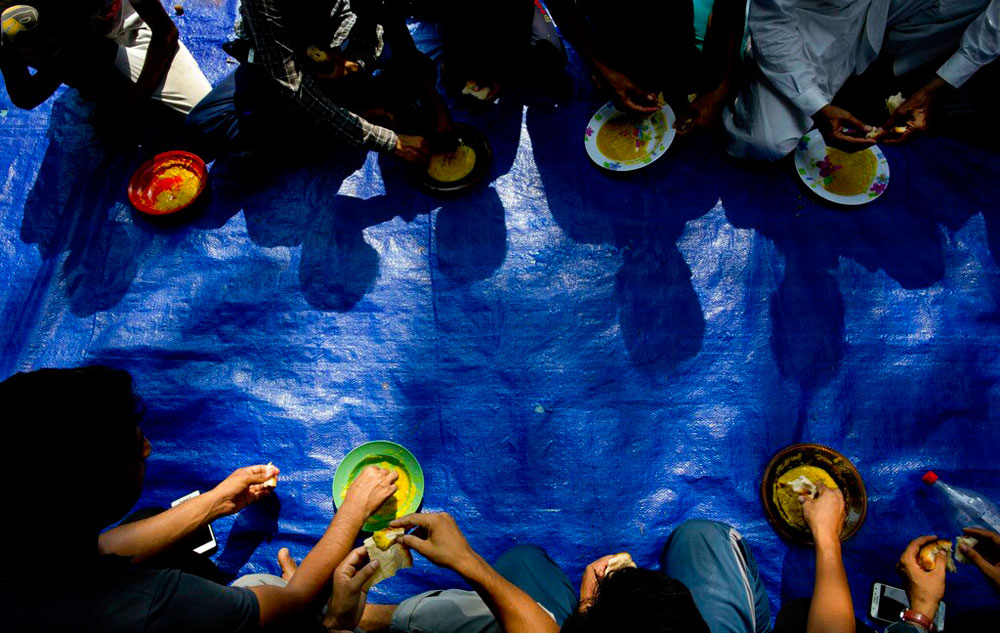After fleeing their homes in Pakistan over militant attacks and government persecution, hundreds of Ahmadi Muslims felt they finally found peace in Sri Lanka as they sought resettlement across the world.
Then came the Easter bombings that killed about 250 people, many Christians praying at church, and suddenly they were targeted again.
They say Sri Lankans suspicious of their beards, their little-known faith and nationalities shouted at some, throwing stones and hitting them with sticks. Others saw their homes attacked.
Now nearly 200 huddle inside their mosque in Negombo and more than 500 sought shelter in the small town of Pasyala, 30km away — just one sign of the fear pervading the Muslim community across the island.
Activists say some Muslim youths have disappeared, perhaps arrested by tight-lipped security forces, while others stay at home, fearful the bombings will spark retaliation from either the government or angry mobs in a nation where inter-religious violence can strike.
“The people in Pakistan attacked us and say we’re not Muslims,” said Tariq Ahmed, a 58-year-old Ahmadi who fled his home. “Then in Sri Lanka, people attack us because they say we are Muslims.”
Sunday’s coordinated suicide bombings targeted three churches and three hotels, killing about 250 people, Sri Lanka's health ministry said late on Thursday. The death toll was revised down from previous police estimates of 359 people. Authorities have blamed a local group, National Towheed Jamaat, previously only known for vandalising Buddhist statues and the extremist online sermons of its leader, alternately named Mohammed Zahran or Zahran Hashmi.
But by Tuesday, the Islamic State group had asserted it carried out the assault, bolstering its claim by publishing images of Zahran and others pledging loyalty to IS leader Abu Bakr al-Baghdadi.
The Ahmadi Muslims say the harassment only grew more amplified in the days after the attack, fuelled by a mistaken sense that since they came from Pakistan, they too must be like the extremists.
But the Ahmadi themselves have fled decades of persecution in Pakistan. Ahmadis believe another Islamic prophet, Ahmad, appeared in the 19th century, a view at odds with the fundamental Islamic principle that Muhammad was the final messenger sent by God.
Pakistan changed its constitution in 1974 to declare Ahmadis non-Muslims. Ten years later, the government declared it a criminal offence for Ahmadis to “pose as Muslims”. They are forbidden from calling their places of worship mosques and cannot sound the call to prayer. Like other religious minorities, they can face blasphemy laws that carry the death penalty, sometimes used by neighbours in petty disputes to target them.
“We are not their enemies. We are facing the same situation these people are facing,” said Qazi Moin Ahmed, 21. “We are not terrorists, but they consider us terrorists.”
Tension grew quickly in Negombo after Sunday’s bombing, which left dozens dead at St Sebastian’s Church. Ahmadi Muslims described being pulled out of tuk-tuks, hit with sticks or pelted with stones. Others said mobs sometimes broke into homes, while others said their Christian landlords, the police or soldiers helped bring them to safety.
Now, police and soldiers protect the Ahmadi mosque in Negombo, while policeman an under-construction Ahmadi community centre in Pasyala, where some 500 other Ahmadis had been based.
Prime Minister Ranil Wickremesinghe acknowledged the attacks the Ahmadis faced during an interview on Thursday night with the AP and said authorities would work to ensure their safety.
Some in Negombo “had become suspicious of foreigners, not of Muslims per se,” he said. “In the heat of the moment, a few have been attacked.”
Nearly all the Ahmadis came to Sri Lanka with hopes of being resettled elsewhere in the world by UNHCR.
Babar Baloch, a UNHCR spokesman, told the AP the agency had received word from refugees that they “have been the targets of threats and intimidation,” and that efforts continued to make sure they were safe. Some 1,600 refugees and asylum seekers are registered with UNHCR in Sri Lanka, he said.
“UNHCR is working closely with local and national authorities who have been very supportive and helpful to ensure the security and safety of all refugees and asylum-seekers during this time of heightened anxiety and concern,” Baloch said.
The concern extends beyond just the Ahmadi, however. There has been religious violence previously between faiths in Sri Lanka.
So far, police have conducted raids and made arrest, but have been careful not to identify suspects or areas perhaps out of the fear of stoking more anger. But even as mosques hang banners supporting the government and denouncing the attack, activists say some Muslim youth have been disappeared, likely detained by authorities.
Alaina Teplitz, the US ambassador to Sri Lanka, said she had heard of similar reports.
“I think those concerns are legitimate in the sense of wanting to make sure there is no overreach given past history,” Teplitz said, referring to the abuses of Sri Lanka's 26-year civil war against Tamil Tiger rebels.
The situation remains tense in Pasyala, hundreds of men catch what sleep they can outside on the patchy grass near the community centre. Women and children live inside. At breakfast on Thursday, the community prepared a lentil soup for those displaced. Men sat cross-legged on a long blue tarp, sopping up the soup with hunks of bread shared from a metal cauldron.
Tariq Ahmed returned to a journalist with his mobile phone. On the line was his worried sister, Bushra Bedum, who lives in Virginia.
“I am very happy before because I thought he was he was safe there, but now I am frightened,” she said. “What can I do?”











